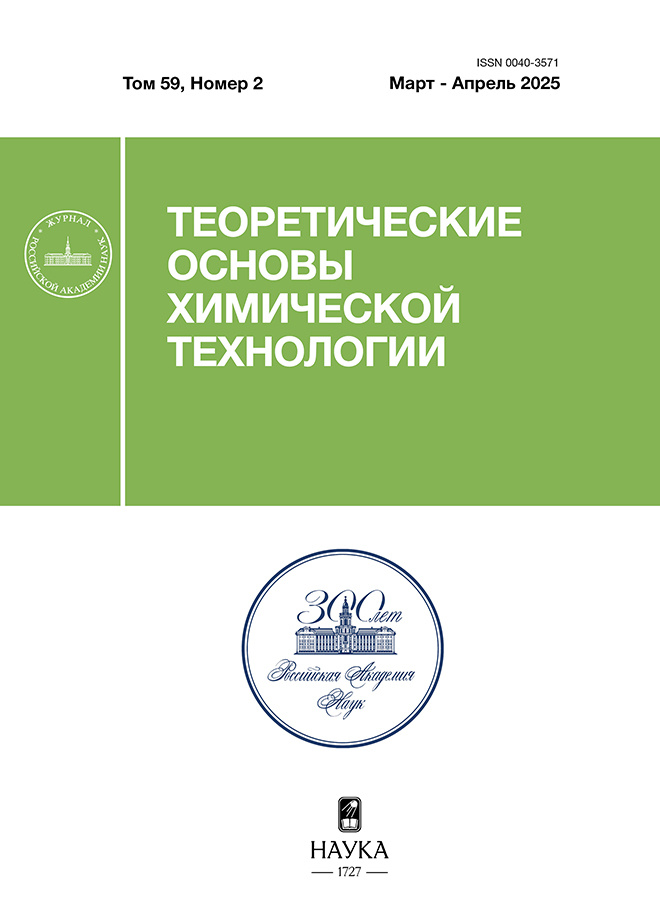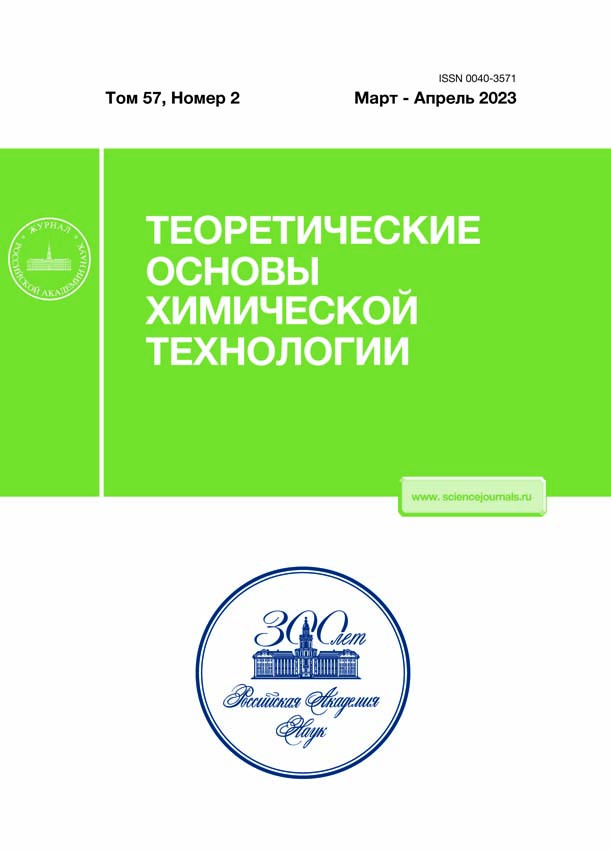Влияние количества и уровня бокового отбора на расход экстрактивного агента в комплексах экстрактивной ректификации с частично связанными тепловыми и материальными потоками
- Авторы: Анохина Е.А.1, Тимошенко А.В.1
-
Учреждения:
- МИРЭА – Российский технологический университет (Институт тонких химических технологий имени М.В. Ломоносова)
- Выпуск: Том 57, № 2 (2023)
- Страницы: 177-187
- Раздел: Статьи
- Статья опубликована: 01.03.2023
- URL: https://rjmseer.com/0040-3571/article/view/652896
- DOI: https://doi.org/10.31857/S0040357123010013
- EDN: https://elibrary.ru/QEEFYE
- ID: 652896
Цитировать
Полный текст
Аннотация
Рассмотрена экстрактивная ректификация трех бинарных смесей (ацетон–хлороформ, ацетон–метанол, аллиловый спирт–аллилацетат) в традиционных двухколонных схемах и в комплексах с частично связанными тепловыми и материальными потоками. Определены оптимальные по критерию суммарных энергетических затрат в кипятильниках колонн параметры схем. Показано, что применение комплексов с частично связанными тепловыми и материальными потоками обеспечивает экономию энергозатрат по сравнению с традиционной схемой на 4.4–29.2%. Выявлено, что при экстрактивной ректификации смеси аллиловый спирт–аллилацетат оптимальное значение расхода экстрактивного агента для двухколонной схемы и комплекса с частично связанными тепловыми и материальными потоками совпадает; оптимальный расход экстрактивного агента в комплексе с частично связанными тепловыми и материальными потоками при разделении смеси ацетон–хлороформ в 1.28 раза ниже, а при разделении смеси ацетон–метанол – в 1.27 раза выше, чем в двухколонной схеме. Установлены причины этого различия.
Об авторах
Е. А. Анохина
МИРЭА – Российский технологический университет (Институт тонких химических технологийимени М.В. Ломоносова)
Email: anokhina.ea@mail.ru
Россия, 119571, Москва
А. В. Тимошенко
МИРЭА – Российский технологический университет (Институт тонких химических технологийимени М.В. Ломоносова)
Автор, ответственный за переписку.
Email: anokhina.ea@mail.ru
Россия, 119571, Москва
Список литературы
- Павлов С.Ю. Выделение и очистка мономеров для синтетического каучука. Л.: Химия, 1987.
- Lei Z.G., Zhou R.Q., Duan Z.T. Process improvement on separating C4 by extractive distillation // Chem. Eng. J. 2002. V.85. P. 379.
- Мазурин О.А., Волков А.Н., Курбатов В.А., Зиятдинов Н.Н. Способ разделения смесей углеводородов изопентан–изоамилен–изопренсодержащией фракции или бутан–бутилен–дивинильной фракции: пат. 2406717 Российская Федерация. № 2008144948/04; заявл. 12.11.2008; опубл. 20.12.2010, Бюл. №35. 5 с.
- Павлов О.С., Павлов С.Ю. Способ разделения алкан-алкеновых фракций: пат. 2379277 Российская Федерация. № 2008126571/04; заявл. 30.06.2008; опубл. 20.01.2012, Бюл. №2. 14 с.
- Гайле А.А., Сомов В.Е. Процессы разделения и очистки продуктов переработки нефти и газа. СПб.: Химиздат, 2012.
- Гайле А.А., Сомов В.Е. Сульфолан. Получение, свойства и применение в качестве селективного растворителя. СПб.: Химииздат, 2014.
- Li W., Xu B., Lei Zh., Dai Ch. Separation of benzene and cyclohexane by extractive distillation intensified with ionic liquid // Chem. Eng. Proc.: Process Intensification. 2018. V. 126. P. 81.
- Дин Ч., Джин В., Чимпяну А., Сили Э. Способы и системы выделения стирола из стиролсодержащего сырья: пат. 2546124 Российская Федерация. № 2012105431/04; заявл. 22.05.2012; опубл. 10.04.2015, Бюл. № 10. 17 с.
- Зарецкий М.И. Очистка коксохимического бензола от тиофена. Получение чистого тиофена из тиофеновой фракции методом экстрактивной ректификации. Расчет промышленной установки // Кокс и химия. 2004. №6. С. 20.
- Han J., Lei Zh., Dong Y., Dai Ch., Chen B. Process intensification on the separation of benzene and thiophene by extractive distillation // AIChE J. 2015. V. 61. № 12. P. 4470.
- Anokhina E.A., Timoshenko A.V., Akishin A.Yu., Remizova A.V. Benzene purification from thiophene usingdimethylformamide as an entrainer in thermally coupled extractive distillation columns // Chem. Eng. Res. Des. 2019. V. 146. P. 391.
- Анохина Е.А., Якутин Р.И., Тимошенко А.В. Очистка бензола от тиофена экстрактивной ректификацией с применением колонн с боковым отбором в паровой фазе // Теорет. основы хим. технол. 2021. Т. 55. № 5. С. 578.
- Shen W., Dong L., Wei S., Li J., Benyounes H., You X., Gerbaud V. Systematic Design of an Extractive Distillation for Maximum-Boiling Azeotropes with Heavy Entrainers // AIChE J. 2015. V. 61. № 11. P. 3898.
- Sprakel L.M.J., Kamphuis P., Nikolova A.L., Keijspe’r D.J., Schuur B. Solvent selection for extractive distillation processes to separate close-boiling polar systems // Chem. Eng. Res. Des. 2019. V. 144, P. 123.
- Жучков В.И., Раева В.М., Фролкова А.К. Выбор селективных агентов для экстрактивной ректификации методом газожидкостной хроматографии // Теорет. основы хим. технол. 2017. Т. 51. № 6. С. 704.
- You X.Q., Rodriguez-Donis I., Gerbaud V. Improved design and efficiency of the extractive distillation process for acetone-methanol with water // Ind. Eng. Chem. Res. 2015. V. 54. P. 491.
- De Figueirêdo M.F., Brito K.D., Wagner B.R., Vasconcelos L.G.S., Brito R.P. Optimization of the design and operation of extractive distillation process // Sep. Sci. Technol. 2015. V. 50. P. 2238.
- Timoshenko A. V., Anokhina E.A., Morgunov A.V., Rudakov D.G. Application of the partially thermally coupled distillation flowsheets for the extractive distillation of ternary azeotropic mixtures // Chem. Eng. Res. Des. 2015. V. 104. P. 139.
- Anokhina Elena, Timoshenko Andrey. Criterion of the energy effectiveness of extractive distillation in the partially thermally coupled columns // Chem. Eng. Res. Des. 2015. V. 99. P. 165.
- Xiaojing Shi, Xiaoxiao Zhao, Zhishan Zhang, Min Li, Jun Gao. Energy-saving quaternary extractive distillation processes with single- or double-dividing-wall column for separation of acetone/methanol/butanone/tert-butyl alcohol // Chem. Eng. Process.: Process Intensif. 2020. V. 153. P. 1.
- Klauzner P.S., Rudakov D.G., Anokhina E.A., Timoshenko A.V. Optimal modes of side-section flow in heat-pump-assisted extractive distillation systems for separating allyl alcohol – allyl acetate mixtures with butyl propionate // Fine Chemical Technologies. 2021. V. 16. № 3. P. 213.
- Yinggui Xu, Jinlong Li, Qing Ye, Yudong Li. Energy efficient extractive distillation process assisted with heat pump and heat integration to separate acetonitrile/1,4-dioxane/water // Process Safety and Environmental Protection. 2021. V. 156. P. 144.
- Nova-Rincón A., Ramos M.A., Gómez J.M. Simultaneous optimal design and operation of a diabatic extractive distillation column based on exergy analysis // International J. Energy. 2015. V. 17. № 3. P. 287.
- Анохина Е.А., Долматов Б.Б., Тимошенко А.В. Энергетическая эффективность экстрактивной ректификации смеси ацетон-хлоpофоpм в сложной колонне с боковой секцией // Хим. технол. 2008. № 8. С. 402.
- Анохина Е.А., Сидорова Ю.И., Тимошенко А.В. Экстрактивная ректификация смеси ацетон – метанол с водой в комплексе с частично связанными тепловыми и материальными потоками // Вестник МИТХТ. 2011. Т.6. № 5. С. 118.
- Анохина Е.А., Тимошенко А.В., Новикова Е.Н. Влияние состава исходной смеси на энергетическую эффективность комплексов со связанными тепловыми и материальными потоками в экстрактивной ректификации смеси аллиловый спирт-аллилацетат // Материалы конференции РХТУ им. Д.И. Менделеева “Ресурсо- и энергосберегающие технологии в химической и нефтехимической промышленности”. Москва, 2006. С. 41.
- Анохина Е.А. Экстрактивная ректификация в комплексах с частично связанными тепловыми и материальными потоками. Дис. … докт. техн. наук. М.: МИРЭА – Российский технологический университет, 2020.
Дополнительные файлы
















